Posts Tagged ‘feedback’
During the holidays we often see people we haven’t seen in a long time. Your family and friends care about you and want to hear what’s happening in your life. Caring and curiosity can lead people to ask questions that you don’t want to answer.
Over Thanksgiving last year I was holding my sister-in-law’s adorable baby. That prompted another family member to ask when I was going to have a baby. I was completely taken aback by the question and simply replied, “I don’t know.”
Friends and family don’t need to know everything that’s happening in your life. None of your business – said a bit differently – is a perfectly acceptable reply. You decide what to share.
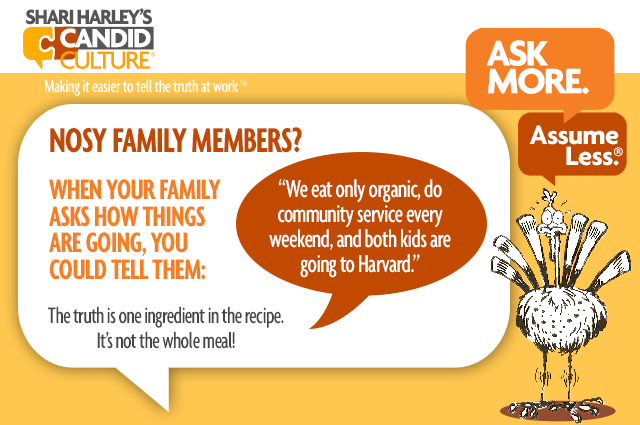
Here are a few possible replies to questions you don’t want to answer:
Question: “What’s happening with that nice young man/woman you’ve been dating?”
Answer: “Things are going great. Thanks for asking.”
Question: “Are you guys serious?”
Answer: “We like each other a lot. If it goes further, I’ll let you know.” Aka, this conversation is over.
Here’s another scenario:
Question: “Are you dating anyone?”
Answer: “No, not right now.”
Question: “You know, I met my husband on Match.com. Have you tried online dating?”
Answer: “That’s great that you met online. I don’t really want to talk about my dating life. What else is happening?”
The next thing she says, “You really should try it. You need to be open. You just never know.”
Answer: “I really appreciate your interest. I’m not looking for dating advice right now, but I really appreciate your concern.” Aka, shut up.
The examples above are about romantic relationships but they could have been about careers, kids, or finances. Your response can be the same. You don’t need to tell anyone anything you don’t want to. It’s ok to tell people to back off and that something is none of their business. You can say it nicely. Just don’t let yourself get cornered into giving information you don’t want to share.
An appropriate answer to almost any personal question is, “I don’t have anything to report on this front, but I’ll let you know when I do.”
An appropriate response to any type of unsolicited advice is, “Thanks so much for your concern. I’m not looking for advice on _____, but I really appreciate you caring.”
Telling someone to back off is perfectly appropriate. S/he’ll get the point and your personal life will remain personal. Boundaries are your friend.
Read How to Say Anything to Anyone, and be ready to manage intrusive questions and unsolicited advice this holiday season. We’re offering a special holiday deal. It’s the best price you’ll find anywhere.
By Shari Harley, Keynote Speaker and Founder and President of www.candidculture.com.
A few weeks ago, a college student introduced me before I spoke at a conference. I heard him practicing out loud shortly before he was to read my introduction on stage. As he practiced, I heard him struggle with the word candor. Initially he pronounced it as can-door vs. can-dor. He’d never seen the word and didn’t know what it meant.
The word candor is not being used on a regular basis. Younger people may not know what it means. And, in my experience, people who are familiar with the word often misinterpret candor to mean bad news. Most people expect bad news to come after the question, “Can I be candid with you?”
The definition of candor is to be honest, truthful and forthright. We at Candid Culture define candor differently. The Candid Culture definition of candor: Telling people what you need before challenges occur. Anticipating everything that can take a project or relationship off track and talking about potential pitfalls before they happen.
Think about the projects and processes in your office – hiring someone new, sourcing a vendor, training people on new software. The potential breakdowns are predictable. You know the pitfalls that can happen when starting anything new because you’ve experienced them.
What if candor sounded like, “We want this project to be smooth. There are a couple of things that will make our work together go well and a few things that may delay the project and have it cost more than we budgeted. Let’s talk about what needs to happen for things to go smoothly, ways to prevent missed deadlines, and how we’re going to handle breakdowns when they happen.”
Some call a conversation like this setting expectations, others call it planning. In my world, these conversations are called candor –talking about what you need when projects begin, rather than letting the anticipatable train wreck happen.
Candor isn’t bad news. It’s telling people how to win with you vs. making them guess.
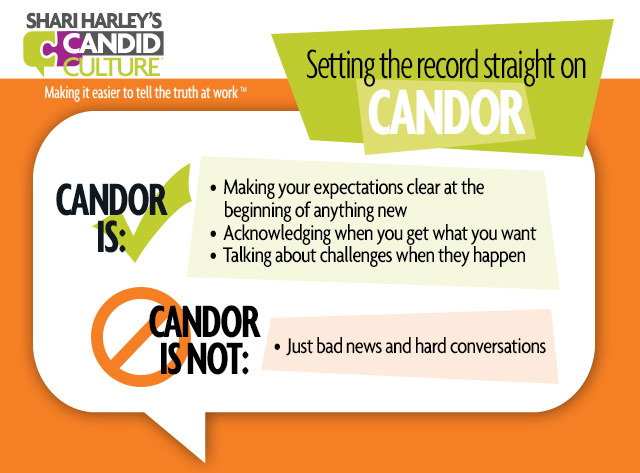
Examples of candor at work and at home:
“Here a few of my pet peeves… It would be great if you could avoid them.”
“What will frustrate you?”
“I turn off my cell phone alerts at night, so feel free to text or call me anytime. I’ll respond to all messages in the morning.”
“I respond to text messages mostly quickly, then voicemail, then emails. If you don’t get a reply to an email within two or three days, don’t take it personally. Chances are I haven’t read the message. Feel free to follow up with a text or voicemail.”
“I work best by appointment. Drop by’s are hard because they interrupt my flow. Email or text me if you need something, and I’ll tell you when I can swing by. Does that work for you?”
For the most part, we treat people as we want to be treated. Other people aren’t us. They don’t do things as we do and don’t know what we want. Don’t make people guess how to work with you, what you need, and what you expect. Be candid and tell them! Then ask what the people you work and live with expect from you.
You won’t get what you don’t ask for.
 Wearing too much perfume or cologne will make people scatter, or wish they could. Unfortunately, rather than tell you that you’re wearing too much, people will just avoid sitting near you. Scent is such a personal thing, like clothing, that people are hesitant to comment on it.
Wearing too much perfume or cologne will make people scatter, or wish they could. Unfortunately, rather than tell you that you’re wearing too much, people will just avoid sitting near you. Scent is such a personal thing, like clothing, that people are hesitant to comment on it.
I suggest not wearing anything scented at work, on airplanes, or when you’ll be in close proximity with other people you don’t know well. But if I can’t persuade you to skip the scent, here are a few guidelines when putting on cologne and perfume:
• Spray the air ten inches in front of you, and walk through the mist, rather than spraying your skin.
• If you can smell the scent on yourself or people who are more than a few inches from you can smell it, you’re wearing too much.
• You should never be able to smell a person’s cologne after they’ve left a room.
No, I’m not an expert on how to wear perfume. I googled it.
The next step is to ask a few people you trust to tell you when you wear too much perfume or cologne. Give people permission to give you this feedback, and promise you won’t bite their head off when they do. This could sound something like, “I want to be sure I’m not wearing too much perfume. Would you be willing to tell me when I do? I promise I won’t freak out or jump down your throat. I really want to know.”
Let’s say you work with someone who wears too much perfume. She hasn’t asked if she’s wearing too much, and you want to say something. You could say something like, “This is a bit awkward, but the perfume you wear is a bit overwhelming. Would you be willing to wear less or none at all when you’re in the office?” This is an awkward conversation that most people don’t want to have. Consider that you’re doing the person a favor. Would you rather know the amount of scent you wear keeps other people away, or would you rather alienate the people around you?
If the relationship is a personal one, you could say, “You wear the most lovely perfume. And I’ve noticed that the smell is quite strong. Would you be willing to wear less of it?” Again, this is an awkward conversation. But you won’t die from having it and the other person won’t either. When she gets over being embarrassed and defensive, your relationship will be fine. And if it’s not, you didn’t have much of a relationship to begin with.

Use our Candor Questions to Advance Careers to find out what people say about you when you’re not there.
Last week some unknown person sent me emails predicting my future. According to the anonymous clairvoyant, in ten years my life will be going well. I’ll have a son who is bright but doesn’t apply himself (shocking), and I’ll be offered a job in Oshkosh that I shouldn’t take. After the third predictive email, the sender wanted to know if I had questions about my future. I didn’t.
- The whole thing was wildly creepy.
- No one should take advice from someone with this much discretionary time. The emailer needs a volunteer job.
- Why would I want someone else to tell me my future? That’s something I enjoy creating.
I’ve got a friend who feels a black cloud follows her. She feels bad things repeatedly happen to her and there’s nothing she does to create these situations, which is, of course, complete garbage.
It may be easier to blame someone or something for the bad things that happen to you, but if someone else is responsible, you have no control. And if you have no control over what happens to you, there is nothing you can do to create the life you really want.
I see myself as 100% responsible for everything that happens to me. As antithetical as it sounds, life is easier when I’m accountable. If I miss a plane because of traffic, I should have left for the airport earlier. If I get overcharged in a restaurant, I should have checked the bill more carefully. If I do a bunch of work for a client and later find out that the work I did isn’t what the client really wanted, I should have asked more questions upfront and asked for feedback earlier.
When I’m responsible for what happens to me, I have some control. When someone else is responsible, I have no control.
I’ll admit to going to a psychic…once. In 2001 I took a transfer from Denver to New York. Living in New York was fun and exciting, and great for my career, but I didn’t enjoy living in such an urban city. I agonized over what to do for two years – go back to Denver, stay in New York, or move someplace else?
Desperately unhappy, but not being able to make a decision, I went to see a psychic. Clearly I had given up. I was going to let someone I’d never met, who didn’t know anything about me, decide my future. Unless you’re at the Jersey Shore and decide to have your palm read for fun, seeing a psychic is abdicating responsibility for your life.
Instead of seeking answers about what might happen, pursue the things you want. If you want a different job in your organization, tell someone who can do something about it. If you got passed over for a job, ask the hiring manager for feedback of what would have made you a better candidate. If the hiring manager doesn’t give you any information, ask your current boss to get the information for you. If one of your co-workers excludes you from projects, ask him why. If someone you work with seems to dislike you, ask for feedback about what you did to damage the relationship. Regardless of how challenging the situation and how disappointing the results, there is ALWAYS something you did to either contribute to the situation or something you can do to change the situation.
I don’t mean to tell you what to do. Nor do I mean to minimize how hard some life circumstances are. But I do want you to see yourself as in charge of what happens to you.
Create the life you want by:
- Asking, “What do I really want, and what’s one thing I can do right now to get closer to that goal?” Then take one step. Then take one more, and so on.
- If negative things are happening, ask, “What could I have done differently to have a different outcome?” Or, ask, “If I could do this over again, what would I do differently.” Then next time, do it differently.
Regardless of how hard or bad something is, there is ALWAYS something you can do to make the situation better. Take your life, your career and your relationships into your own hands, where they belong.
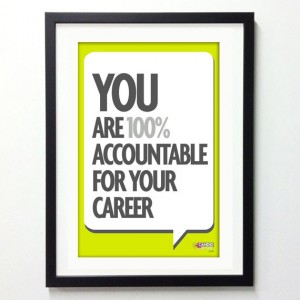
Email us if you want this career management phrase on a poster, note card, notebook, or magnet.
Vague is useless. Being vague is actually worse than useless. Being vague instills doubt in the people around you and reduces your credibility.
When a customer service agent answers my questions with words like, “That sounds right, I think so, or that should work,” I hang up and call back, hoping to get someone who can give me an affirmative answer. People do this to you too, they just don’t tell you about it.
Watch your language. If the answer is yes, say “Yes.” If the answer is no, say “No.” “I think so,” says neither yes nor no. Saying, “I think so” tells people you don’t really know.
A few phrases to avoid and what to say instead:
Avoid: “That should be done by Friday.”
Instead, be specific and give a final date. “That will be complete by Friday. If I can’t get it done by Friday, I’ll call you to let you know by 5:00 pm on Thursday.”
Avoid: “Sounds right.”
Instead, be specific and say, “That’s correct.”
Avoid: “We should be able to do that.”
Instead, be specific and say, “We can do that.”
Avoid: “I guess.”
Instead, be specific and say, “Yes” or “No.”
When I teach feedback training, the biggest thing training participants struggle with is specificity. “You’re difficult to work with.” “Your clothing is inappropriate.” “I just find you to be negative.” “You did a good job on that.” “It’s a pleasure to have you on the team.” All of this is vague and thus unhelpful to the feedback recipient. And the same is true when answering questions and making promises.
Tell people exactly what to expect. Be specific. Even if they don’t like your answer, they’ll be happy to have a clear answer.
 When the people we work with don’t do their jobs, we might find ourselves saying, “He should be more on top of things.” “She shouldn’t make commitments she can’t keep.” “He doesn’t know what he’s doing, and that’s not my problem.” The challenge is, when your coworkers don’t perform, it is your problem.
When the people we work with don’t do their jobs, we might find ourselves saying, “He should be more on top of things.” “She shouldn’t make commitments she can’t keep.” “He doesn’t know what he’s doing, and that’s not my problem.” The challenge is, when your coworkers don’t perform, it is your problem.
When your coworkers don’t get you the information you need in a timely way, you miss deadlines. When you work from incorrect information, your reports are wrong. When others don’t work with you, you look bad. So you can be right all day about how others perform, and your reputation will still be negatively impacted.
I don’t suggest you enable your coworkers by doing the work others don’t. I do suggest you help your coworkers be successful by holding them accountable.
Here are a few things you can do to manage your career and get what you need from your business relationships:
- Don’t assume others will meet deadlines. Check in periodically and ask, “What’s been done so far with the XYX project?” Notice, I didn’t suggest asking, “How are things going with the XYZ project.” “How are things going” is a greeting, not a question.
- Set iterative deadlines. If March 20th is your drop dead deadline, ask to see pieces of work incrementally. “Can I see the results of the survey on March 5th, the write up on March 10th, and the draft report on March 15th?” One of the biggest mistakes managers and project managers make is not practicing good delegation by setting iterative deadlines and reviewing work as it’s completed.
- Don’t just email and ask for updates. The people you work with are overwhelmed with email. And email is too passive. Visit people’s offices or pick up the phone. Saying, “I emailed him and haven’t heard back” makes you look as bad as the other person who missed a deadline.
You might be thinking, “Holding my coworkers accountable is awkward. I don’t have the formal authority, and I don’t want my coworkers to think I’m bossy or damage my business relationships.”
It’s all in the how you make requests.
If you’ve seen me speak or have read the business book How to Say Anything to Anyone, you know I believe in setting clear expectations at the beginning of anything new. That could sound something like, “I’m looking forward to working with you on the XYZ project. How would you feel if we set iterative deadlines, so we can discuss work as it is completed? You’ll get just-in-time input, making any necessary adjustments as we go, and we’ll stay ahead of schedule. How does that sound? How are the 5th, 10th, and 15th as mini deadlines for you?”
Many people put large projects off until the last minute. People procrastinate less when large projects are broken into smaller chunks with correlating deadlines. You strengthen your business relationships and support people in meeting deadlines and not procrastinating when you agree on completion dates when projects begin. Also, most of us unfortunately know what it’s like to put a lot of work into a project, have someone review our completed work, and then be told we went down the wrong path and need to start over. It’s days like this that make being a Walmart greeter seem appealing.
Ask more. Assume less. Don’t assume your coworkers will do what they’re supposed to do. Ask upfront to see pieces of work on agreed upon dates. Pick up the phone versus rely on email to communication. And know that the people you work closely with are a reflection of you. Strengthen your business relationships. Get people working with you, and everyone will look good.
There is one job interview question recruiters and hiring managers must ask. And the answer should be a deal breaker.
The most important job interview question for any role and level, in every organization: Tell me about a time you received negative feedback.
This is NOT the same question as tell me about a weakness. Or tell me about a time you made a mistake at work. Those are also important job interview questions to ask. But they’re not the most important question.
Let’s assume everyone you interview is age sixteen and older. Unless your candidates live in a cave, never speaking to anyone, it’s not possible to arrive at age 16 without having received negative feedback. The feedback can come from a friend, teacher, or parent. It doesn’t need to be work related.
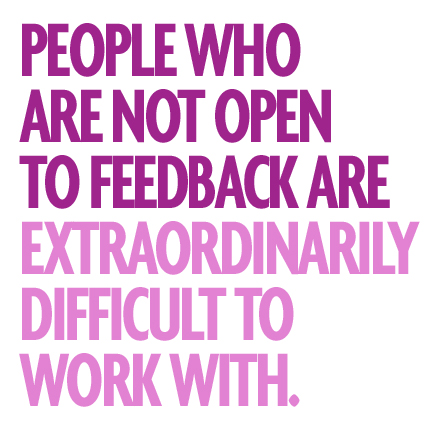
The point of the question is to discover whether the candidate is open to feedback. People who are not open to feedback are extraordinarily difficult to work with. They aren’t coachable. Any type of feedback they receive will result in resistance and defensiveness.
Employees who aren’t open to feedback won’t change or improve their behavior, regardless of how effective a manager is. Instead of listening to feedback and taking corrective action, employees who are not open to feedback will tell managers why they are wrong.
Everyone you interview has received negative feedback at some point. The question is whether or not candidates were open enough to listen to the feedback. People who aren’t open to feedback won’t be able to answer your question.
If candidates can’t tell you about a time they received negative feedback, ask a follow-up question. Your job as the interviewer is to give candidates every possible opportunity to be successful. If you don’t get the answer you’re looking for, ask the interview question in two different ways, until you’re certain the candidate can’t or won’t answer the question.
If candidates can’t tell you about a time they received negative feedback, ask what their reputation is at their current job or was at a previous job. Candidates probably won’t be able to answer this question either. Most people don’t know their reputation at work.
Even if a candidate doesn’t know with certainty his reputation at work, the answer he provides will give you a sense of how self aware he is. People who are self aware are more open to feedback and are easier to coach and manage than people who are not self aware.
I really do eliminate candidates who demonstrate that they aren’t open to feedback –whether I’m hiring for Candid Culture or for one of my clients. I don’t care how credentialed or experienced the candidate is.
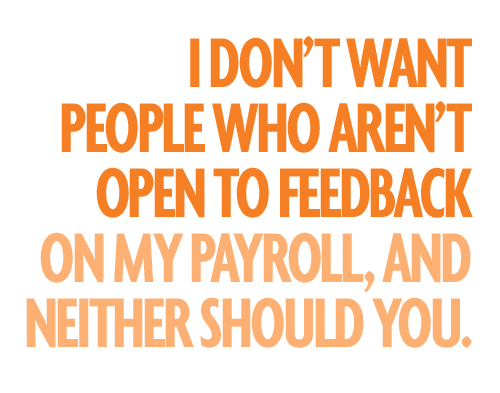
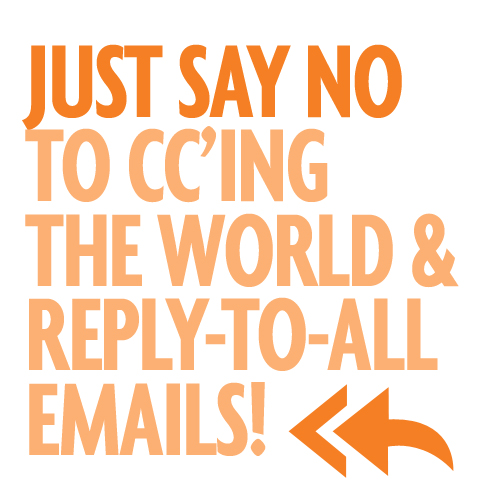
You need something from Suzanne. Suzanne tends to ignore your emails. So in frustration, when sending Suzanne requests, you begin Cc’ing your boss and Suzanne’s boss. This has happened to most of us.
People Cc people who don’t really need to receive communications for a few reasons:
1) Sometimes people really aren’t sure who needs to know the information. So just to be safe, they include others. This can be quite innocent.
2) Sometimes people want others to know what they’re up to (a.k.a. they’re seeking recognition). This is not necessarily bad. It’s important to share what you’re doing for the organization, and cc’ing ancillary people on emails can be a very smart thing to do.
3) Lastly, sometimes people are afraid they won’t get what they need from the email recipient, so they Cc lots of people. This is typically not so innocent.
What should you do when someone Cc’s the world when emailing you, and you fear that it makes you look bad?
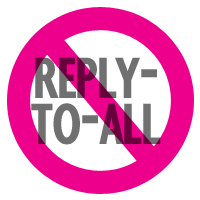
I suggest speaking directly with people who Cc others on emails. The conversation could sound something like this, “I noticed that when you email me you have a tendency to Cc other department heads. For example, last week when you asked me for the year-end numbers, you Cc’d my boss, Lisa in Marketing, and Bob in Sales. I was wondering why you’re doing that?”
Then stop talking and listen to what the person says.
Depending on what s/he says, you can respond with something like, “I will always strive to provide you with what you need. If you don’t get what you need from me in a timely way, by all means escalate your request, and go to the people above me. But I’d really appreciate if you’d come to me first and give me a chance to fulfill your request. Would you be willing to do that?”
If the person says something like, “I just think Lisa and Bob need to have this information. I have no other agenda,” you can respond with something like, “I don’t think they need this information, but why don’t we ask them. Would you be comfortable with that? I’ll send them both a message and Cc you, letting them know we talked about this email chain, and ask if they want to continue to receive the messages. How does that sound?”
You never know why someone is doing something, even if you think you know. Ask!

I encourage you to say something versus nothing. If you say nothing you’ll likely make decisions about the person and about your working relationship that may or may not be accurate. If you say nothing, the behavior is bound to continue.
People change their behavior for two reasons, positive and negative consequences. No consequences, no behavior change. No one likes to be ‘called on’ their behavior. Often a conversation like the one above will make the person uncomfortable enough to stop doing what they’re doing.
Reply All Etiquette:
More innocent than Cc’ing the world, but equally annoying, is the reply-to-all email. Someone in your office sends around a joke. Seventy-five people feel compelled to reply to all with their feelings about the joke. When I see things like this, I count how much money in lost wages companies are spending, that is, after I’ve put a pen in my eye.
To prevent reply to all emails, the person who initiates the first email can put in LARGE FONT, “Please reply only to me!”
You can also bcc people on the initial email so the reply’s don’t go to everyone.
It also takes only one person who asks people to stop replying to all, for the email chain to stop. And it’s perfectly appropriate to do this. The email could sound something like, “Going forward, please only reply to Brian, versus replying to all. Thank you!”
When things in the workplace frustrate you, it can be easier to say nothing than to say something. Saying nothing will also help nothing. The frustration is still there. The relationships are still damaged. Gather your courage, and save your office mates a lot of time.
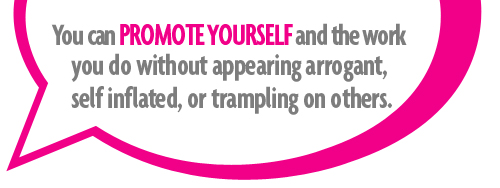
Most managers write performance appraisals from a blank page. They sit at their desks trying to remember all the good things employees did throughout the year. But it’s hard to remember a whole year’s worth of events. So the appraisal ends up being a review of the last quarter, which is all they can remember.
Don’t let this happen to you.
The time to start preparing for your performance appraisal is now. Not in January, now.
Two months ago I wrote a blog encouraging you to ask your boss’s permission to give him/her a list of your 2012 accomplishments. Just in case you didn’t do it, I’m reminding you again.
Most of us are not great at self promotion. We think that if we do great work, the right people will notice, and we’ll get the recognition – status, money, responsibility – we deserve. In fact, many people critique others who are good at self promotion thinking that they’re suck ups, who make themselves look good at others’ expense. And we don’t want to be like that. So we decide, “I’ll quietly do my job well and eventually I’ll get the recognition I deserve.”
You can promote yourself and the work you do without appearing arrogant, self inflated, or trampling on others.
Think about it this way, no one knows the work you do better than you do. Your boss doesn’t follow you around. S/he doesn’t know all the great stuff you do every day. It’s your job to tell her.
Here’s how to promote yourself:
Create a one-page sheet of your projects and accomplishments. Bring this sheet to your one-one-one meetings with your boss, however frequently they occur. At the end of the year these sheets become the cheat sheet from which to write your review. Aggregate all the information you’ve captured during the year and ask your boss’s permission to provide it to help him/her write your appraisal. S/he won’t say no. Writing appraisals is time consuming. If you can make the process easier, it strengthens your relationship with your boss and makes you look good. But you must ask for permission to send the list.
If you haven’t been assembling a list of accomplishments, create one for 2012 now. And start creating a list in January of 2013, and add to the list regularly.
It’s your job to promote yourself and tell the people you work with what you’re doing. Simply say:
“Here’s what I’ve been focused on…”
“Here are a few projects my team finished…”
“Here’s something I’m working on…”
“I’m really proud of…”
Any of these phrases will do the trick. Don’t make your boss guess. Make it easy to promote you.
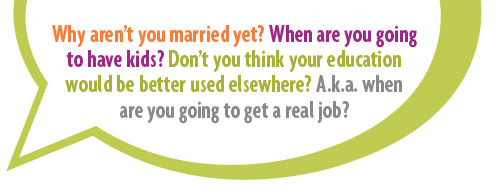
You may be looking forward to seeing your family this weekend, but may not be looking forward to their inquiries and advice about the status of your life.
Unsolicited feedback is often unwelcome. Most people are more open to hearing another’s point of view when she asked us if she can share it first.
If your family starts to pry or give unsolicited feedback, there are a few things you can do.
- Thank them for caring. Then tell them that you’re really trying not to think about ______ (insert topic). And ask if you can talk about something else.
Or…
- Thank them for caring, and tell them that you aren’t looking for advice about _____ (insert topic). Again, you appreciate their concern and will come to them for guidance, when that’s what you want.
The people in your life care about you. They want to make a difference. Chances are they are not even aware they’re giving unsolicited advice. Many people give advice so automatically, they don’t even know they’re doing it.
Things not to do:
Don’t apologize for not wanting to talk about a subject or for rejecting unsolicited advice. Unless you’ve been rude or mean spirited in your communication, you have nothing to apologize for.
You could consider trying to prevent unsolicited advice by setting expectations before awkward conversations happen. Tell your family and friends that you are excited to see them, but don’t want to talk about _______ (insert job, spouse, speeding tickets, weight loss, or whatever ails you). Or, tell them that you do want to share what’s happening with (insert situation) but are not looking for advice. Tell your family and friends, if they can resist the temptation to tell you what to do, you’ll be happy to give them an update.
Here are a few sample scripts:
“Thanks so much for being concerned about my career. I really appreciate it. I’m not looking for advice right now, but if I want to talk about it, I’ll let you know. Thanks again for being concerned.”
Yes, you really can say this.
Here’s another one: “Thanks so much for being concerned about me. I know you want me to be happy and only want what’s best for me. I don’t really want to talk about my relationship with Lisa/Bob. But again, I really appreciate your concern.”
Yes, you can really say that too.
If you want more sample language, there are many more examples in my new book. And in honor of unsolicited advice week (a.k.a. Thanksgiving), we’re having a buy one-get-one free special. Maybe your mom will read the book!!


You may be concerned that speaking up will damage the relationship and decide it’s easier to say nothing. But the relationship is damaged anyway. When we avoid people or are afraid to say what we really think, our relationships need work. So why not speak up, make a request, and see if things get better?
If you have a tendency to give unsolicited advice, catch yourself. Try this instead, “I’ve been thinking about your desire to break into a new field work wise. I have a couple of ideas. Do you want to talk about it?”
Or, “I’ve been thinking about your relationship with Joe/Suzanne. You mentioned it’s been a struggle of late. Do you want to talk about it?”
Then let the person say no. If you’re going to make a conversation available, it must be ok to say no! If the person can’t say no without offending you or damaging your relationship, you’ve made a demand, not a request.
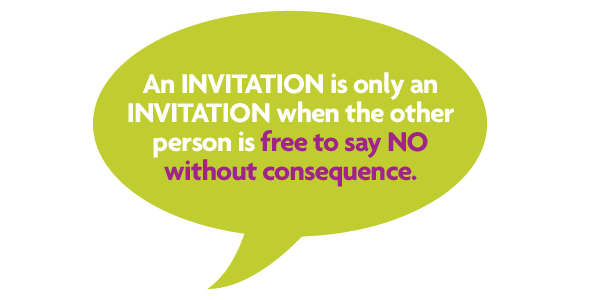
Make your holiday less stressful and more fun by telling the truth. If it goes badly, you can blame me. Be sure to call and tell me, so I can write about you next week. I’ll ask for your permission before I do it!




 Wearing too much perfume or cologne will make people scatter, or wish they could. Unfortunately, rather than tell you that you’re wearing too much, people will just avoid sitting near you. Scent is such a personal thing, like clothing, that people are hesitant to comment on it.
Wearing too much perfume or cologne will make people scatter, or wish they could. Unfortunately, rather than tell you that you’re wearing too much, people will just avoid sitting near you. Scent is such a personal thing, like clothing, that people are hesitant to comment on it.












